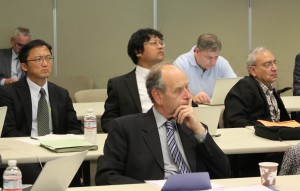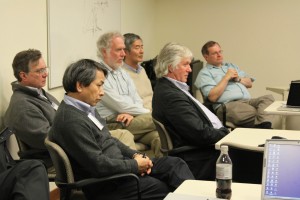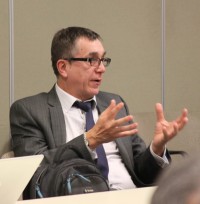The major activity for the Global Design Effort in January was centred on the second Baseline Assessment Workshop held at SLAC from 18 to 21 January. Nick Walker reported on the meeting in this column last week, and I will report on the proposed change actions as soon as they occur. But in addition, by chance scheduling, the Funding Agencies for Large Colliders (FALC), the GDE oversight group for resources, also held their biannual meeting at SLAC on 22 January. We were able to take advantage of this timing coincidence by arranging for an informal meeting between FALC members and the GDE Executive Committee. What resulted was a unique and lively discussion focused on the future of the ILC project once we complete our Technical Design Report (TDR) at the end of 2012.
FALC is an informal forum where representatives of funding agencies from different countries exchange information and views on ongoing and future large international projects for particle physics. I participate in their meeting, as do the directors from major laboratories. Brian Foster has been participating over the past year or so to report on our work on ILC governance.
The joint discussions between FALC and the GDE Executive Committee consisted of a two-hour informal session where a set of short presentations were made during the first hour, followed by an interesting free-form discussion during the second hour. The short talks were given by ILC Research Director Sakue Yamada on ILC detector activities and resources, followed by three talks by the GDE regional directors on ILC R&D programmes and resources around the world: Brian Foster for Europe, Mike Harrison for the Americas and Kaoru Yokoya for Asia. At the end of these presentations, Mike Harrison shared some of our recent thinking as to what might be elements of a technically driven ILC programme after 2012.
The open discussion following these presentations focused mainly on the future programme beyond the TDR. We will have completed the mandate of the GDE after completing the TDR, but we anticipate that will still be too early to propose an ILC construction project. In most timelines, we now expect it will take a few more years before sufficient Large Hadron Collider results will be available to point the way for the next big project in particle physics. However, a recent decision at CERN to extend their coming run period to two years is encouraging and increases the possibilities for significant early results.
Nevertheless, the question we are pondering is what programme would be justifiable and most useful to move the ILC project forward if the decision on a linear collider construction project is delayed a few years? This topic is also being considered by the International Linear Collider Steering Committee and ICFA, especially from an organisational point of view, and that will be a major focus of their meeting in Beijing in February.
During the discussion between FALC and EC, the focus was more on the technical programme, including superconducting radiofrequency R&D, industrialisation, value engineering, and other R&D topics. There was no attempt to draw consensus, but certain themes emerged in the discussion. In general, the tenor of the discussion was receptive to developing a continuing programme, but some valuable points were made. For example, there were several comments that were supportive of a selective technically driven programme, especially one that features topics that would both advance the ILC design and be of value for other projects.
Richard Wade, chief operating officer and deputy chief executive of the Science and Technology Facilities Council (STFC) in the UK, gave some rather candid advice that we should be very mindful of the value and legacy of our technological programme, independent of whether the ILC is ever built. This seemed to be a sobering remark, especially for those of us dedicating so much of our efforts towards making the ILC a reality. However, there is much to be said for the intrinsic value of our programme and the impacts it makes, which go far beyond our raison d’être, the ILC, and we should take full advantage of exploiting this legacy.





Recent Comments